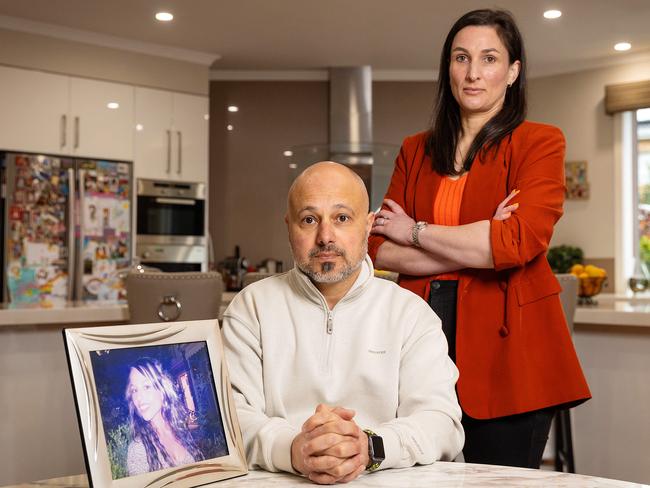Calls for coroner’s inquest into death of Louisa Ioannidis after she was found dead in Melbourne
Louisa Ioannidis was found dead in a creek 13 years ago in Melbourne. However, new clues could blow the case back open. See her brother speak in a new video.
National
Don't miss out on the headlines from National. Followed categories will be added to My News.
More than a decade after Louisa Ioannidis was found face down in a creek wearing a pink robe, there are fresh calls to reopen the case on her mysterious death.
The 24-year-old’s lifeless body was found by strangers walking at Darebin Creek in Melbourne on October 11, 2011.
It’s unclear how Ms Ioannidis ended up there, but in her final hours, neighbours reported seeing blood on her ear, followed by an unsuccessful attempt to flee the country.
During the investigation, police relied partly on her partner, who is known as Joe – but isn’t his legal name. He was facing a domestic violence charge at the time, but the matter never proceeded due to the death.

Months before her death, Ms Ioannidis was flagged as “at risk” by police during Operation Check Up 2011, a proactive domestic violence initiative.
There are no suggestions Joe is responsible for what happened to Ms Ioannidis.
Now, a change.org petition gaining momentumcalls for a coroner’s inquest into the death, driven by new evidence from ex-cop turned private investigator Julia Robson.
Despite the cause of death being recorded as “consistent with drowning”, questions remain about how she ended up in the creek.

Her half-brother Anastasios, known as Tass, has sought answers since his sister’s death.
“Louisa was bubbly, fun to be around …. smart but very mischievous at the same time,” Tass said.
“I’m sure if she had gone down a different road she might have lived a better life … we just want a thorough investigation.”
A GRIM DISCOVERY
Darebin Creek in Melbourne’s north connects quiet neighbourhoods before meeting the Yarra River.
It was at this creek, near Preston Parklands, where two passers-by discovered Ms Ioannidis’ body.
A police statement later described her wearing only one sock, tight jeans, and a pink dressing gown.
A detective at the scene declared the death non-suspicious.
The decision not to involve the homicide squad meant no additional experts were called in.
Tass last spoke to his sister two weeks earlier.
“For a week or two, I was trying to get a hold of her by her phone, which just kept going to her message bank. I also sent her emails as well,” he said.

He eventually became so concerned that he drove over to her unit in Preston, but never found her.
He reported her missing to Reservoir Police. The officer he spoke to was the one who found the body two days later.
ALLEGATIONS OF DOMESTIC VIOLENCE
Ms Ioannidis’ close friend Indigo, who did not want her full name used, recalled disturbing instances of abuse.
“Joe slapped Louisa across the face. I can remember that vividly now,” she said.
Indigo recounted a birthday incident in 2010 when Louisa disclosed: “They had a fight, and he poured boiling water on her from the kettle, then took her to the hospital.”
“There were times she had a black eye from his violent actions.”

Indigo claimed Ms Ioannidis had openly spoken about wanting to leave the relationship.
Ms Ioannidis reported one incident to police in June 2011. In her statement she said: “Joe grabbed me by the shoulder and hair, dragged me out of the car, and told me to shut up and get inside.”
Police charged Joe with assault, and due to her death, the matter never proceeded.
FINAL DAY ALIVE
Ms Ioannidis was last seen by her neighbour when she popped in to use their mobile phone.
“A neighbour said they had noticed blood near Louisa’s left ear (in the morning),” Ms Robson said.
“However, that evening (a different neighbour saw) the blood seemed to have migrated to the other side of her head.”
Police and the coroner partly relied on Joe’s account. He claimed that at about 9:45pm, Louisa left home and ran towards Darebin Creek.
No witnesses saw her enter the water that night, nor did anyone see her struggling in the water.
Adjunct Professor and Criminologist Kerry Carrington expressed concern that the person recounting Ms Ioannidis’ final movements was also facing charges for allegedly assaulting her.
“Because she’s dead, her voice is silent,” Ms Carrington said.
“The only perspective that seems to be considered is the perspective of the partner.”
DROWNING CLAIMS
Despite theories Ms Ioannidis drowned, historical data showed the creek was approximately 40 centimetres deep that night.
Two experts said the information challenged the theory the drowning could be attributed to high water levels in the creek.
“Inner suburban creeks don’t have currents,” Prof Carrington said.
“You wouldn’t drown if you could swim. You would drown if you became unconscious, or if you were unconscious when you were thrown in or fell in.”

Expert Andrea Zaferes, who has extensive experience in water-related deaths, also echoed those statements after looking at the autopsy report.
“I don’t see anything here that is even consistent with drowning,” Ms Zaferes said.
“She has normal weight lungs and according to this her lungs are completely normal.
“You cannot just look at a body and say, ‘Oh, they drowned’ or ‘no, they didn’t drown’.
“This (death) should have been undetermined.”
A FINAL PUSH
As the push for a inquest continues, one thing remains clear: until the circumstances surrounding the death are thoroughly examined and understood, there will be no closure.
Friends and family believe an inquest is essential.
“There’s still information we haven’t accessed as well as identified inconsistencies in witness statements that need to be tested,” Ms Robson said.
“If Louisa’s death was determined to be ‘undecided’ rather than consistent with drowning, then that also suggests a possibility Louisa may have already been incapacitated, even deceased, on entry to the creek.”
You can listen to Louisa Ioannidis’ full story on podcast Troubled Waters
Originally published as Calls for coroner’s inquest into death of Louisa Ioannidis after she was found dead in Melbourne




